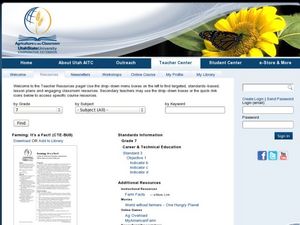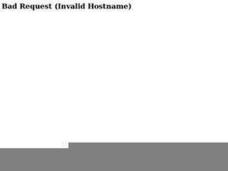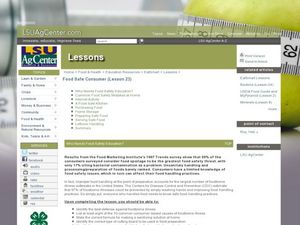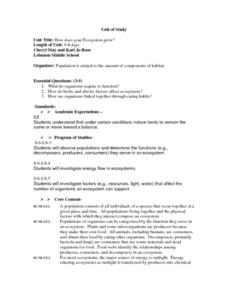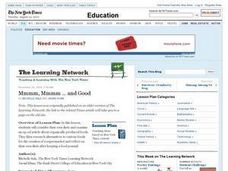Curated OER
Theobroma - Food of the Gods
Students discuss the history of cacao and its use in the production of chocolate. They analyze actual cacao pods and record their observations. Finally they create a five minute contour drawing of the cacao pod and seeds.
Curated OER
Nutrition -- A Lesson for Life - Biology Teaching Thesis
Students briefly explain the importance of nutrition in their everyday lives, and they tell you about how many calories they should consume in a day. They list readily available and affordable healthy foods that they LIKE to eat....
Global Change
Impact of a Changing Climate on the Pacific Walrus
How many of us can say they've seen a Pacific walrus? Not many and one of the reasons is the impact of climate change on their aquatic environment. Children get to think about the food web of the Bering Sea by creating an actual web with...
NOAA
Deep-Sea Ecosystems – Entering the Twilight Zone
Imagine an ecosystem without any light or oxygen, where living things convert carbon dioxide into food. This ecosystem is thriving and might just be the largest ecosystem on our planet, yet we know very little about it. The lesson...
Curated OER
A Model for Natural Selection- Spaghetti Worms
Does the early bird really get the worm? If so, which color of worm does it prefer? In an exciting and easy week-long field investigation, young field biologists set up a one square meter feeding area for birds. If you have a webcam,...
NOAA
Deep-Sea Ecosystems – Life is Weird!
A pool of brine in the deep sea can be up to four times as salty as the surrounding sea water. The deep sea ecosystem relies on chemosynthesis and the organisms that live there are often strange to us. The lesson focuses on researching...
Curated OER
Food Web Follies
Seventh graders cut and paste animal pictures to create a food web and trace the path of energy. They write a paragraph explaining the importance of photosynthesis in all food webs.
Curated OER
Farming: It's a Fact!
Students use worksheets, food items, and computer programs to learn about the path of food from the farm to their meals. For this agriculture lesson, students use a provided worksheet to learn facts about farming. They use a bag of...
Curated OER
Sustainability and Extinction
Galapagos Penguins are the only penguins on earth that live north of the equator (in the wild). In this last lesson plan a discussion on how the Galapagos islands developed their populations and diversity sparks the introduction. Two...
Curated OER
Explore the Food Web
Young scholars identify plants and animals in the journals of Lewis and Clark's expedition. They describe the various animal habits. Students interpret the behaviors of the animals discovered on the expedition. They design a food web...
Curated OER
Polar Food Web Comparison
Seventh graders practice the evaluation component of the scientific method while comparing and contrasting the similarities and differences of the food chains and webs of polar animal life. They study about classification and ecology...
Alliance Theater
The Jungle Book Post-Show STEAM Lesson
An ecosystem is really just the flow of energy through many different living organisms. A study of Rudyard Kipling's The Jungle Book leads to an environmental science activity in which learners study how various factors can affect...
Curated OER
Peek at the Chesapeake!
Students research organisms that live in the Chesapeake Bay ecosystem. In this science lesson, students choose an organism and research how it is affected by humans. Students create a presentation of their findings.
Curated OER
Food Safe Consumer
Pupils explain how to prepare and keep food safely. In this health science lesson, students research common mistakes and tips for maintaining a clean kitchen. They identify main causes of foodborne diseases.
Curated OER
How do pollutants bioaccumulate and biomagnify?
Students review the basic concepts of the food chain. In small groups, they research an organism and create a food web. In addition, they study biomagnifications and write a brief essay or make a poster informing others about the...
Curated OER
Industrial Agriculture
Students write about the benefits that industrial agriculture has had on growing crops. In this industrial agriculture lesson plan, students research how technology has impacted the processing speed of growing food.
Curated OER
Habitat survival
Sixth graders study different environments and how the food chain affects the survival of different animals. In this environments lesson plan, 6th graders share the visuals which describe the characteristics of the environment that they...
Curated OER
Packaging: What a Waste!
Students examine the environmental and economic impacts of excess packaging. They investigate the price and relative amount of processing and packaging of different food products in a local grocery store, analyze graphs, and complete a...
Curated OER
Mangrove Ecosystem
Eager ecologists explore ecosystems through video and photographs of a Mangrove. They discuss the animals in this habitat and how they interact with each other after reading and discussing "The Sea, the Storm and the Mangrove Tangle."...
Curated OER
Foods for Better Health
Students define biotechnology and discuss the economic impact of biotechnology. They also describe what a 1015 onion and a slow-softening tomato are and how they are produced. They examine the safety of genetically-engineered or altered...
Curated OER
How Does Your Ecosystem Grow?
Students consider that under certain conditions in nature tend to remain the same or move toward a balance. They observe populations and determine the functions (e.g., de-composers, producers, consumers) they serve in an ecosystem. They...
Curated OER
Nutrition Track
Students examine the importance of a healthy diet based on the USDA food pyramid. They log their daily food intake in a journal. They create charts to analyze and compare their diets to the USDA recommended allowances.
Curated OER
Mmmm, Mmmm ... and Good
Students consider their own diets and examine an op-ed article about organically produced foods. They research alternatives to various foods for the creation of a supermarket and reflect on their own diets after keeping a food journal.
Curated OER
Economics: What Are Some Other Uses for Rice?
Sixth graders investigate ways rice is sold by creating a chart of the different rice foods. In this economics lesson, 6th graders examine their local food store and list at least 10 rice by-products in a class chart. Students discover...









